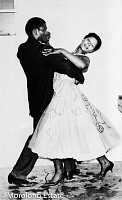BIOGRAPHY

DANIEL ‘KGOMO’ MOROLONG
(b. 1928 East London, South Africa, d. 2012 East London, South Africa)
Daniel ‘Kgomo’ Morolong was born on 5 May 1928, in Tsolo Location, East London. He attended a leading educational institution, Healdtown, Fort Beaufort, where he studied for two years up to Form Two, and didn’t finish school, as the family could not afford to pay his school fees. Morolong quickly grew up to be a very busy man who held down a day job, while at night playing the double bass in a large jazz band - the African Quavers, under the leadership of Eric Nomvete. The Quavers were very popular at the time and would later become the legendary Havana Swingsters. Amazingly, he still managed to find time for another love – photography, doing his own developing and printing, often only when he got home from gigs.
Initially photography was a hobby, but because of a dearth of photographers in those days, he began to take it more seriously. In his words, ‘…those were the days when people were really hungry for photos and didn’t have cameras to do the job’. The cost of cameras, lenses, film, developing and printing would have been prohibitive for people who earned very little or nothing at all. Despite these obstacles he made it work, he says, ‘I went on...because it’s something that I loved’.
At first Morolong operated as a typical street photographer, taking photographs of people and then displaying them where his subjects could view and buy them. His most popular photographs were the ones he took of people on outings to the beach. As a freelancer, Morolong supplied the Daily Dispatch (specifically the African Edition weekly supplement) in East London with social pictures, news and sports pictures.
His first studio was in his house, thereafter he moved a few times until the Morolex Ideal Studios found its home in the CNDC (Ciskeian National Development Corporation) Lennox Sebe Building in Mdantsane in about 1968. He shared the space with his wife’s sewing business, both of which thrived until tragedy struck - the building was burnt to the ground by looters following the Gqozo coup in 1990.All of Mr Morolong’s equipment, negatives, and photographs (besides the few he had at home) were lost in the fire.
In the words of Nelson Mandela ‘the world over, official versions of history have proved to be as subjective as those of individuals. In authoritarian states, history is written by those in power … The stories of ordinary people are lost.’ The Morolong Collection provides us with a wonderfully positive testament to the power of the human spirit and ensures that the images we have of apartheid are not only about struggle and oppression, but also of individuals bettering themselves and enjoying their lives.
The work of Daniel Morolong was re-discovered during of the land restitution process in the East and West Bank communities in East London (1999-2002) when the Institute of Social and Economic Research (ISER) allowed claimants to help prove their cases through the use of photographs of their former homes. A few of the images were subsequently shown at the Ann Bryant Art Gallery, East London (September 2000) under the title: ‘Dislocations: Visualizing Hidden Urban Pasts’. ISER showed the work at the Gallery once more from 28 August to 31 October 2003, along with two other exhibitions, as part of an international conference titled The Eastern Cape: Historical Legacies and New Challenges which took place in East London.
The Collection lay dormant again until part of it was included in the Underexposed Project, UCT, in collaboration with Duke University, USA. Underexposed is a collection of documentary photography, showcasing different twentieth and twenty-first century photographers' work over many decades, including both the pre and post-apartheid periods. It forms part of the Digital collections at the UCT Libraries and Duke also houses a collection of prints as part of their South Africa Documentary Photographs Collection.
Sadly Morolong and his wife passed away before it was possible to do him the honor of exhibiting his work. He is survived by his children: Lipuo, Lehlohonolo, Puisetso and Retsidisitsoe.
Claire McNulty (Cape Town) 2015
SELECTED EXHIBITIONS
2023 Winter, group show, Everard Read, Cape Town, South Africa
Natural Habitat, 16 on Lerotholi, Cape Town, South Africa
2021 OASIS: 25th anniversary group show, Everard Read, Cape Town, South Africa
2019 Daniel ‘Kgomo’ Morolong & Hugh Masekela, Mesh Photography Series, Everard Read, Johannesburg, South Africa
2018 Snaps, solo, Everard Read, Cape Town, South Africa
2016 AKAA Fair, with Everard Read, Paris, France
2015 The Other Camera, group show, Commune 1, Cape Town, South Africa



